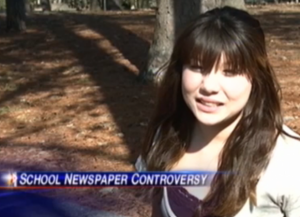High school editorial on atheism is censored

Krystal Myers is a student at Lenoir City High School in Tennessee. She is an honor student, captain of the swim team and editor of the student newspaper, the Panther Press. Krystal is also an atheist.
In an attempt to discuss being an atheist in a predominantly Christian student body, Krystal wrote an editorial for the school paper. In “No Rights: The Life of an Atheist,” she opens her article by asking “Why does atheism have such a bad reputation? Why do we not have the same rights as Christians?”
In “No Rights,” Krystal gives examples of practices at her school that offend her as an atheist. Prayer before graduation ceremonies and athletic events, and religious messages on clothing worn by teachers were pointed out.
She also cited the Supreme Court decision in Lee v. Weisman (1992) where the Justices, in a five to four ruling, found that prayer at a graduation ceremony was a state-sponsored religious exercise in which students were forced to participate. A student’s choice was to attend and thereby compromise their religious beliefs or choose not to attend at all. The Court recognized the dilemna the student faced: “Everyone knows that in our society and in our culture, high school graduation is one of life’s most significant occasions.” Deborah Lee was in eighth grade when she challenged her school’s prayer practice at graduation. She won her case in time for her high school graduation four years later.
The school administration denied Krystal permission to publish her editorial. Unlike some public schools, Lenoir City High School granted staff the authority to censor articles by students. Other states with student free expression laws leave the decision to the student journalism staff.
Read Krystal’s editorial and decide for yourself if it is appropriate for a high school audience: “No Rights: Life of an Atheist” by Krystal Myers.




It’s funny that there is a CHRISTian Rock singer named Krystal Myers.
Having read her essay, it is no wonder the school censored it. She is eloquent, erudite, concise, and provides excellent examples where she tried to make a point. The rabidly religious would have no means of adequately responding to it, so they prevented its publishing in the first place.
The strongest argument is the one that answers questions posed to it. The weakest argument is the one that uses force to prevent questions from being asked. Clearly, Myers is the former and the alleged “educators” are the latter.